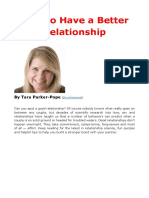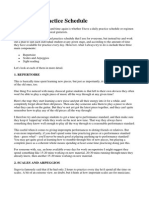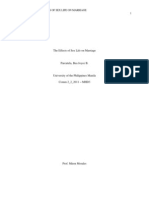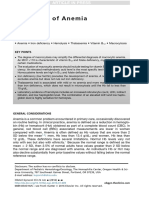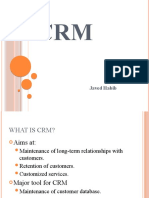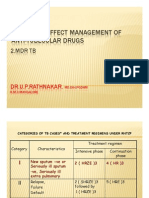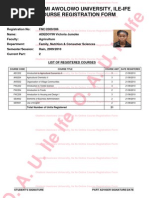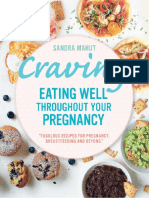Masters of Love - The Atlantic
Masters of Love - The Atlantic
Uploaded by
Giovanni De SantisCopyright:
Available Formats
Masters of Love - The Atlantic
Masters of Love - The Atlantic
Uploaded by
Giovanni De SantisOriginal Description:
Copyright
Available Formats
Share this document
Did you find this document useful?
Is this content inappropriate?
Copyright:
Available Formats
Masters of Love - The Atlantic
Masters of Love - The Atlantic
Uploaded by
Giovanni De SantisCopyright:
Available Formats
Masters of Love - The Atlantic
http://www.theatlantic.com/health/archive/2014/06/happily-ever-af...
Masters of Love
Science says lasting relationships come down toyou guessed
itkindness and generosity.
sketchblog/ickr
EMILY ESFAHANI SMITH
JUN 12, 2014
TEXT
H E ASIZE
LTH
Every day in June, the most popular wedding month of the year, about
13,000 American couples will say I do, committing to a lifelong
relationship that will be full of friendship, joy, and love that will carry them
forward to their nal days on this earth.
Except, of course, it doesnt work out that way for most people. The
majority of marriages fail, either ending in divorce and separation or
devolving into bitterness and dysfunction. Of all the people who get
married, only three in ten remain in healthy, happy marriages, as
psychologist Ty Tashiro points out in his book The Science of Happily Ever
After, which was published earlier this year.
1 di 11
9/30/16 2:39 PM
Masters of Love - The Atlantic
http://www.theatlantic.com/health/archive/2014/06/happily-ever-af...
Social scientists rst started studying marriages by observing them in
action in the 1970s in response to a crisis: Married couples were divorcing
at unprecedented rates. Worried about the impact these divorces would
have on the children of the broken marriages, psychologists decided to cast
their scientic net on couples, bringing them into the lab to observe them
and determine what the ingredients of a healthy, lasting relationship were.
Was each unhappy family unhappy in its own way, as Tolstoy claimed, or
did the miserable marriages all share something toxic in common?
"Disaster" couples showed signs of
being in ght-or-ight mode in
their relationships. Having a
conversation sitting next to their
spouse was, to their bodies, like
facing o with a saber-toothed
tiger.
Psychologist John Gottman was one of those researchers. For the past four
decades, he has studied thousands of couples in a quest to gure out what
makes relationships work. I recently had the chance to interview Gottman
and his wife Julie, also a psychologist, in New York City. Together, the
renowned experts on marital stability run The Gottman Institute, which is
devoted to helping couples build and maintain loving, healthy relationships
based on scientic studies.
John Gottman began gathering his most critical ndings in 1986, when he
set up The Love Lab with his colleague Robert Levenson at the
University of Washington. Gottman and Levenson brought newlyweds into
the lab and watched them interact with each other. With a team of
2 di 11
9/30/16 2:39 PM
Masters of Love - The Atlantic
http://www.theatlantic.com/health/archive/2014/06/happily-ever-af...
researchers, they hooked the couples up to electrodes and asked the
couples to speak about their relationship, like how they met, a major
conict they were facing together, and a positive memory they had. As
they spoke, the electrodes measured the subjects' blood ow, heart rates,
and how much they sweat they produced. Then the researchers sent the
couples home and followed up with them six years later to see if they were
still together.
From the data they gathered, Gottman separated the couples into two
major groups: the masters and the disasters. The masters were still happily
together after six years. The disasters had either broken up or were
chronically unhappy in their marriages. When the researchers analyzed the
data they gathered on the couples, they saw clear dierences between the
masters and disasters. The disasters looked calm during the interviews, but
their physiology, measured by the electrodes, told a dierent story. Their
heart rates were quick, their sweat glands were active, and their blood ow
was fast. Following thousands of couples longitudinally, Gottman found
that the more physiologically active the couples were in the lab, the quicker
their relationships deteriorated over time.
But what does physiology have to do with anything? The problem was that
the disasters showed all the signs of arousalof being in ght-or-ight
modein their relationships. Having a conversation sitting next to their
spouse was, to their bodies, like facing o with a saber-toothed tiger. Even
when they were talking about pleasant or mundane facets of their
relationships, they were prepared to attack and be attacked. This sent their
heart rates soaring and made them more aggressive toward each other. For
example, each member of a couple could be talking about how their days
had gone, and a highly aroused husband might say to his wife, Why dont
you start talking about your day. It wont take you very long.
The masters, by contrast, showed low physiological arousal. They felt calm
and connected together, which translated into warm and aectionate
behavior, even when they fought. Its not that the masters had, by default,
3 di 11
9/30/16 2:39 PM
Masters of Love - The Atlantic
http://www.theatlantic.com/health/archive/2014/06/happily-ever-af...
a better physiological make-up than the disasters; its that masters had
created a climate of trust and intimacy that made both of them more
emotionally and thus physically comfortable.
Gottman wanted to know more about
RELATED STORY
how the masters created that culture of
love and intimacy, and how the
disasters squashed it. In a follow-up
study in 1990, he designed a lab on
the University of Washington campus
to look like a beautiful bed and
Stressful Relationships vs. Isolation:
The Battle for Our Lives
breakfast retreat. He invited 130
newlywed couples to spend the day at
this retreat and watched them as they
did what couples normally do on
vacation: cook, clean, listen to music,
eat, chat, and hang out. And Gottman made a critical discovery in this
studyone that gets at the heart of why some relationships thrive while
others languish.
Throughout the day, partners would make requests for connection, what
Gottman calls bids. For example, say that the husband is a bird
enthusiast and notices a goldnch y across the yard. He might say to his
wife, Look at that beautiful bird outside! Hes not just commenting on
the bird here: hes requesting a response from his wifea sign of interest or
supporthoping theyll connect, however momentarily, over the bird.
The wife now has a choice. She can respond by either turning toward or
turning away from her husband, as Gottman puts it. Though the bird-bid
might seem minor and silly, it can actually reveal a lot about the health of
the relationship. The husband thought the bird was important enough to
bring it up in conversation and the question is whether his wife recognizes
and respects that.
People who turned toward their partners in the study responded by
4 di 11
9/30/16 2:39 PM
Masters of Love - The Atlantic
http://www.theatlantic.com/health/archive/2014/06/happily-ever-af...
engaging the bidder, showing interest and support in the bid. Those who
didntthose who turned awaywould not respond or respond minimally
and continue doing whatever they were doing, like watching TV or reading
the paper. Sometimes they would respond with overt hostility, saying
something like, Stop interrupting me, Im reading.
These bidding interactions had profound eects on marital well-being.
Couples who had divorced after a six-year follow up had turn-toward
bids 33 percent of the time. Only three in ten of their bids for emotional
connection were met with intimacy. The couples who were still together
after six years had turn-toward bids 87 percent of the time. Nine times
out of ten, they were meeting their partners emotional needs.
***
By observing these types of interactions, Gottman can predict with up to
94 percent certainty whether couplesstraight or gay, rich or poor,
childless or notwill be broken up, together and unhappy, or together and
happy several years later. Much of it comes down to the spirit couples bring
to the relationship. Do they bring kindness and generosity; or contempt,
criticism, and hostility?
Theres a habit of mind that the masters have, Gottman explained in an
interview, which is this: they are scanning social environment for things
they can appreciate and say thank you for. They are building this culture of
respect and appreciation very purposefully. Disasters are scanning the
social environment for partners mistakes.
Contempt is the number one
factor that tears couples apart.
5 di 11
9/30/16 2:39 PM
Masters of Love - The Atlantic
http://www.theatlantic.com/health/archive/2014/06/happily-ever-af...
Its not just scanning environment, chimed in Julie Gottman. Its
scanning the partner for what the partner is doing right or scanning him for
what hes doing wrong and criticizing versus respecting him and expressing
appreciation.
Contempt, they have found, is the number one factor that tears couples
apart. People who are focused on criticizing their partners miss a whopping
50 percent of positive things their partners are doing and they see
negativity when its not there. People who give their partner the cold
shoulderdeliberately ignoring the partner or responding minimally
damage the relationship by making their partner feel worthless and
invisible, as if theyre not there, not valued. And people who treat their
partners with contempt and criticize them not only kill the love in the
relationship, but they also kill their partner's ability to ght o viruses and
cancers. Being mean is the death knell of relationships.
Kindness, on the other hand, glues couples together. Research
independent from theirs has shown that kindness (along with emotional
stability) is the most important predictor of satisfaction and stability in a
marriage. Kindness makes each partner feel cared for, understood, and
validatedfeel loved. My bounty is as boundless as the sea, says
Shakespeares Juliet. My love as deep; the more I give to thee, / The more
I have, for both are innite. Thats how kindness works too: theres a great
deal of evidence showing the more someone receives or witnesses
kindness, the more they will be kind themselves, which leads to upward
spirals of love and generosity in a relationship.
There are two ways to think about kindness. You can think about it as a
xed trait: either you have it or you dont. Or you could think of kindness as
a muscle. In some people, that muscle is naturally stronger than in others,
but it can grow stronger in everyone with exercise. Masters tend to think
about kindness as a muscle. They know that they have to exercise it to keep
it in shape. They know, in other words, that a good relationship requires
sustained hard work.
6 di 11
9/30/16 2:39 PM
Masters of Love - The Atlantic
http://www.theatlantic.com/health/archive/2014/06/happily-ever-af...
If your partner expresses a need, explained Julie Gottman, and you are
tired, stressed, or distracted, then the generous spirit comes in when a
partner makes a bid, and you still turn toward your partner.
In that moment, the easy response may be to turn away from your partner
and focus on your iPad or your book or the television, to mumble Uh huh
and move on with your life, but neglecting small moments of emotional
connection will slowly wear away at your relationship. Neglect creates
distance between partners and breeds resentment in the one who is being
ignored.
The hardest time to practice kindness is, of course, during a ghtbut this
is also the most important time to be kind. Letting contempt and
aggression spiral out of control during a conict can inict irrevocable
damage on a relationship.
Kindness doesnt mean that we dont express our anger, Julie Gottman
explained, but the kindness informs how we choose to express the anger.
You can throw spears at your partner. Or you can explain why youre hurt
and angry, and thats the kinder path.
John Gottman elaborated on those spears: Disasters will say things
dierently in a ght. Disasters will say Youre late. Whats wrong with you?
Youre just like your mom. Masters will say I feel bad for picking on you
about your lateness, and I know its not your fault, but its really annoying
that youre late again.
***
For the hundreds of thousands of couples getting married this monthand
for the millions of couples currently together, married or notthe lesson
from the research is clear: If you want to have a stable, healthy
relationship, exercise kindness early and often.
7 di 11
9/30/16 2:39 PM
Masters of Love - The Atlantic
http://www.theatlantic.com/health/archive/2014/06/happily-ever-af...
"A lot of times, a partner is trying
to do the right thing even if it's
executed poorly. So appreciate the
intent."
When people think about practicing kindness, they often think about small
acts of generosity, like buying each other little gifts or giving one another
back rubs every now and then. While those are great examples of
generosity, kindness can also be built into the very backbone of a
relationship through the way partners interact with each other on a
day-to-day basis, whether or not there are back rubs and chocolates
involved.
One way to practice kindness is by being generous about your partners
intentions. From the research of the Gottmans, we know that disasters see
negativity in their relationship even when it is not there. An angry wife may
assume, for example, that when her husband left the toilet seat up, he was
deliberately trying to annoy her. But he may have just absent-mindedly
forgotten to put the seat down.
Or say a wife is running late to dinner (again), and the husband assumes
that she doesnt value him enough to show up to their date on time after he
took the trouble to make a reservation and leave work early so that they
could spend a romantic evening together. But it turns out that the wife was
running late because she stopped by a store to pick him up a gift for their
special night out. Imagine her joining him for dinner, excited to deliver her
gift, only to realize that hes in a sour mood because he misinterpreted
what was motivating her behavior. The ability to interpret your partners
actions and intentions charitably can soften the sharp edge of conict.
Even in relationships where people are frustrated, its almost always the
8 di 11
9/30/16 2:39 PM
Masters of Love - The Atlantic
http://www.theatlantic.com/health/archive/2014/06/happily-ever-af...
case that there are positive things going on and people trying to do the right
thing, psychologist Ty Tashiro told me. A lot of times, a partner is trying
to do the right thing even if its executed poorly. So appreciate the intent.
Another powerful kindness strategy revolves around shared joy. One of the
telltale signs of the disaster couples Gottman studied was their inability to
connect over each others good news. When one person in the relationship
shared the good news of, say, a promotion at work with excitement, the
other would respond with wooden disinterest by checking his watch or
shutting the conversation down with a comment like, Thats nice.
Weve all heard that partners should be there for each other when the going
gets rough. But research shows that being there for each other when things
go right is actually more important for relationship quality. How someone
responds to a partners good news can have dramatic consequences for the
relationship.
In one study from 2006, psychological researcher Shelly Gable and her
colleagues brought young adult couples into the lab to discuss recent
positive events from their lives. They psychologists wanted to know how
partners would respond to each others good news. They found that, in
general, couples responded to each others good news in four dierent
ways that they called: passive destructive, active destructive, passive
constructive, and active constructive.
Lets say that one partner had recently received the excellent news that she
got into medical school. She would say something like I got into my top
choice med school!
Those who showed genuine
interest in their partner's joys were
more likely to be together.
9 di 11
9/30/16 2:39 PM
Masters of Love - The Atlantic
http://www.theatlantic.com/health/archive/2014/06/happily-ever-af...
If her partner responded in a passive destructive manner, he would ignore
the event. For example, he might say something like: You wouldnt
believe the great news I got yesterday! I won a free t-shirt!
If her partner responded in a passive constructive way, he would acknowledge
the good news, but in a half-hearted, understated way. A typical passive
constructive response is saying Thats great, babe as he texts his buddy
on his phone.
In the third kind of response, active destructive, the partner would diminish
the good news his partner just got: Are you sure you can handle all the
studying? And what about the cost? Med school is so expensive!
Finally, theres active constructive responding. If her partner responded in
this way, he stopped what he was doing and engaged wholeheartedly with
her: Thats great! Congratulations! When did you nd out? Did they call
you? What classes will you take rst semester?
Among the four response styles, active constructive responding is the
kindest. While the other response styles are joy-killers, active constructive
responding allows the partner to savor her joy and gives the couple an
opportunity to bond over the good news. In the parlance of the Gottmans,
active constructive responding is a way of turning toward your partners
bid (sharing the good news) rather than turning away from it.
Active constructive responding is critical for healthy relationships. In the
2006 study, Gable and her colleagues followed up with the couples two
months later to see if they were still together. The psychologists found that
the only dierence between the couples who were together and those who
broke up was active constructive responding. Those who showed genuine
interest in their partners joys were more likely to be together. In an earlier
study, Gable found that active constructive responding was also associated
with higher relationship quality and more intimacy between partners.
There are many reasons why relationships fail, but if you look at what
10 di 11
9/30/16 2:39 PM
Masters of Love - The Atlantic
http://www.theatlantic.com/health/archive/2014/06/happily-ever-af...
drives the deterioration of many relationships, its often a breakdown of
kindness. As the normal stresses of a life together pile upwith children,
career, friend, in-laws, and other distractions crowding out the time for
romance and intimacycouples may put less eort into their relationship
and let the petty grievances they hold against one another tear them apart.
In most marriages, levels of satisfaction drop dramatically within the rst
few years together. But among couples who not only endure, but live
happily together for years and years, the spirit of kindness and generosity
guides them forward.
ABOUT THE AUTHOR
EMILY ESFAHANI SMITH is a writer based in Ann Arbor, Michigan. She is a columnist at The
New Criterion, an editor at the Hoover Institution, and the author of the forthcoming The Power
of Meaning: Crafting a Life that Matters.
Around the Web
11 di 11
Ads by Revcontent
9/30/16 2:39 PM
You might also like
- College Project Report - NewDocument26 pagesCollege Project Report - NewTRIPURARI KUMAR75% (12)
- What Makes Love Last?: How to Build Trust and Avoid BetrayalFrom EverandWhat Makes Love Last?: How to Build Trust and Avoid BetrayalRating: 4.5 out of 5 stars4.5/5 (29)
- The Seven Principles for Making Marriage Work: A Practical Guide from the Country's Foremost Relationship Expert by John Gottman PhD | Conversation StartersFrom EverandThe Seven Principles for Making Marriage Work: A Practical Guide from the Country's Foremost Relationship Expert by John Gottman PhD | Conversation StartersRating: 3 out of 5 stars3/5 (2)
- Johann Sebastian Bach - BWV 1004 (Kazuhito Yamashita Arr.)Document28 pagesJohann Sebastian Bach - BWV 1004 (Kazuhito Yamashita Arr.)Lincoln Antonio Herrera Noriega89% (27)
- Seven Principles For Making Marriage Work | SummaryFrom EverandSeven Principles For Making Marriage Work | SummaryRating: 4 out of 5 stars4/5 (5)
- Almeno Tu Nell Universo GuitarDocument3 pagesAlmeno Tu Nell Universo GuitarGiovanni De Santis0% (1)
- The Dynamics of Infidelity Applying Relationship Science To Psychotherapy Practice by Lawrence JosephsDocument378 pagesThe Dynamics of Infidelity Applying Relationship Science To Psychotherapy Practice by Lawrence Josephstelmafsp2100% (1)
- Hold Me Tight: Seven Conversations for a Lifetime of Love by Sue Johnson | Conversation StartersFrom EverandHold Me Tight: Seven Conversations for a Lifetime of Love by Sue Johnson | Conversation StartersRating: 3 out of 5 stars3/5 (7)
- Definitive Edition The Guitar Etudes, Ed Kazutaka OgawaDocument142 pagesDefinitive Edition The Guitar Etudes, Ed Kazutaka Ogawasergioldc65100% (7)
- Anger ManagementDocument190 pagesAnger ManagementGiovanni De Santis100% (13)
- 50 Great-Gottman Seven Principles For Making Marriage WorkDocument5 pages50 Great-Gottman Seven Principles For Making Marriage WorkAnonymous Ax12P2sr88% (17)
- How To Have A Better RelationshipDocument27 pagesHow To Have A Better RelationshipFabián BarbaNo ratings yet
- Social ScienceDocument6 pagesSocial Scienceviv nobleNo ratings yet
- Teenagers in LoveDocument4 pagesTeenagers in LoveJanessa BautistaNo ratings yet
- Love In Abundance: a counselor's advice on open relationshisFrom EverandLove In Abundance: a counselor's advice on open relationshisRating: 4 out of 5 stars4/5 (4)
- Enjoy!: The Gift of Sexual Pleasure for WomenFrom EverandEnjoy!: The Gift of Sexual Pleasure for WomenRating: 4 out of 5 stars4/5 (3)
- Almeno-Tu-Nell-Universo Guitar PDFDocument3 pagesAlmeno-Tu-Nell-Universo Guitar PDFGiovanni De Santis50% (2)
- Classical Guitar PracticeDocument68 pagesClassical Guitar PracticeGiovanni De Santis89% (9)
- CI-F-0030 Internal ISM Document of Compliance ChecklistDocument14 pagesCI-F-0030 Internal ISM Document of Compliance Checklistsergiy100% (1)
- DXN Presentation For Saudi ArabiaDocument54 pagesDXN Presentation For Saudi Arabiaridwanua100% (1)
- How To Have A Better RelationshipDocument20 pagesHow To Have A Better RelationshipRatan jotNo ratings yet
- PhilpaperDocument5 pagesPhilpaperapi-283548665No ratings yet
- Love_ More like Loneliness (Phil Paper #1)Document4 pagesLove_ More like Loneliness (Phil Paper #1)chrisjackson9898No ratings yet
- What Exactly Is LoveDocument4 pagesWhat Exactly Is LoveTran Quynh MaiNo ratings yet
- Assignment Two Peer WorkshopDocument11 pagesAssignment Two Peer WorkshopAdam BennettNo ratings yet
- Man StressDocument46 pagesMan StressJasmin AndradeNo ratings yet
- Personal RelationshipDocument119 pagesPersonal RelationshipCarl Anthony Lague PahuyoNo ratings yet
- For Better: How the Surprising Science of Happy Couples Can Help Your Marriage SucceedFrom EverandFor Better: How the Surprising Science of Happy Couples Can Help Your Marriage SucceedRating: 3.5 out of 5 stars3.5/5 (34)
- What Makes A Healthy RelationshipDocument36 pagesWhat Makes A Healthy RelationshipRatan jot100% (2)
- Extra Marital AffairsDocument6 pagesExtra Marital AffairsYummyNo ratings yet
- EIP First DraftDocument6 pagesEIP First DraftCheyenne WestNo ratings yet
- Com330 Research PaperDocument9 pagesCom330 Research Paperapi-686924303No ratings yet
- Is There Sex After Marriage?: Professional Advice on How to Bring Desire Back and Make Sex BetterFrom EverandIs There Sex After Marriage?: Professional Advice on How to Bring Desire Back and Make Sex BetterRating: 5 out of 5 stars5/5 (2)
- Love RelsDocument46 pagesLove Relsmagnifygodfrey419No ratings yet
- In the Search for Love. A Book about Emotional Pain and Pleasure of Loving.From EverandIn the Search for Love. A Book about Emotional Pain and Pleasure of Loving.No ratings yet
- Sources of Violence in Romantic Relationships; with Psychological and Philosophical Guidance on How to Deal with Them.From EverandSources of Violence in Romantic Relationships; with Psychological and Philosophical Guidance on How to Deal with Them.No ratings yet
- BPS BRoken HeartsDocument5 pagesBPS BRoken HeartsUm ArNo ratings yet
- Secret Sex: Real People Talk About Outside Relationships They Hide from Their PartnersFrom EverandSecret Sex: Real People Talk About Outside Relationships They Hide from Their PartnersRating: 1 out of 5 stars1/5 (2)
- See WhatDocument26 pagesSee WhatJawhara SpanyaNo ratings yet
- The Truth About Same-Sex Marriage and The Health Hazards of HomosexualityDocument6 pagesThe Truth About Same-Sex Marriage and The Health Hazards of HomosexualityVigilantCitizenNo ratings yet
- EIPDocument7 pagesEIPCheyenne WestNo ratings yet
- Love Between Equals: How Peer Marriage Really WorksFrom EverandLove Between Equals: How Peer Marriage Really WorksRating: 3.5 out of 5 stars3.5/5 (11)
- J Marital Family Therapy - 2007 - Grunebaum - THINKING ABOUT ROMANTIC EROTIC LOVEDocument13 pagesJ Marital Family Therapy - 2007 - Grunebaum - THINKING ABOUT ROMANTIC EROTIC LOVEwordonlineeeeeNo ratings yet
- RRLDocument3 pagesRRLAJ ToledoNo ratings yet
- The Effects of Sex Life On Marriage - Pos. PaperDocument5 pagesThe Effects of Sex Life On Marriage - Pos. PaperBea Parcutela100% (1)
- Sources, Resources, and Facts ExplainedDocument31 pagesSources, Resources, and Facts ExplainedDatum VivelacriqueNo ratings yet
- Discuss A Sociocultural Approach To Personal RelationshipsDocument3 pagesDiscuss A Sociocultural Approach To Personal RelationshipsInaya nayyarNo ratings yet
- An Essay On LoveDocument52 pagesAn Essay On LoveAmin Ali100% (2)
- For A Long, Healthy and Rewarding Life: The Biological Key To ItDocument3 pagesFor A Long, Healthy and Rewarding Life: The Biological Key To ItJuanPabloMedinaNo ratings yet
- Argumentative EssayDocument5 pagesArgumentative EssayJoshua MontoyaNo ratings yet
- Definition of LoveDocument31 pagesDefinition of LoveAinaa NajwaaNo ratings yet
- Affect of Cohabitation Title PageDocument14 pagesAffect of Cohabitation Title Pageapi-309768754No ratings yet
- Critique PaperDocument2 pagesCritique Paperbilly bongNo ratings yet
- Family Ties: How Siblings Shape YouDocument4 pagesFamily Ties: How Siblings Shape Youbonnie_vaughanNo ratings yet
- The Essential Rules of Love: A Practical Guide to Creating a Harmonious, Healthy, and Happy RelationshipFrom EverandThe Essential Rules of Love: A Practical Guide to Creating a Harmonious, Healthy, and Happy RelationshipNo ratings yet
- The Price of Love Losing Two of Your Closest FriendsDocument4 pagesThe Price of Love Losing Two of Your Closest FriendsThiago Jardim AmanteaNo ratings yet
- Romantic Relationship ThesisDocument8 pagesRomantic Relationship Thesisfjm38xf3100% (2)
- The 15-Minute Relationship Fix: A Clinically-Proven Strategy That Will Repair and Strengthen Your Love LifeFrom EverandThe 15-Minute Relationship Fix: A Clinically-Proven Strategy That Will Repair and Strengthen Your Love LifeNo ratings yet
- Moss Et Al - The Premarital Dyad During The SixtiesDocument21 pagesMoss Et Al - The Premarital Dyad During The SixtiesLaura AlexyaNo ratings yet
- Love KernbergDocument12 pagesLove KernbergAmma Synkletyka100% (1)
- Revised Copy 1Document14 pagesRevised Copy 1api-455768639No ratings yet
- Essay 2 Annotated BibliographyDocument9 pagesEssay 2 Annotated Bibliographyapi-581774942No ratings yet
- Investigative Interview Methods FerraroDocument17 pagesInvestigative Interview Methods FerraroGiovanni De SantisNo ratings yet
- Antonio Lauro Vol 8 Arr Alirio DiazDocument9 pagesAntonio Lauro Vol 8 Arr Alirio DiazGiovanni De Santis100% (3)
- Loss and Theft White PaperDocument14 pagesLoss and Theft White PaperGiovanni De SantisNo ratings yet
- Gradus Ad Parnassum (Ganesh)Document5 pagesGradus Ad Parnassum (Ganesh)Giovanni De Santis100% (1)
- Basic StrokesDocument2 pagesBasic StrokesGiovanni De SantisNo ratings yet
- Anger Management TheDocument190 pagesAnger Management TheGiovanni De Santis100% (1)
- 10ths InnerPedalsDocument3 pages10ths InnerPedalsGiovanni De SantisNo ratings yet
- Epox Ep-9npa3 Sli Ep-9npa7 ManualDocument84 pagesEpox Ep-9npa3 Sli Ep-9npa7 ManualGiovanni De SantisNo ratings yet
- Guitar Pro - Coltrane Changes PatternsDocument1 pageGuitar Pro - Coltrane Changes PatternsGiovanni De SantisNo ratings yet
- Piket 2022Document2 pagesPiket 2022puskesmas jetisNo ratings yet
- ABP3 IntoxmetalespesadosDocument18 pagesABP3 IntoxmetalespesadosFernandoLuyoNo ratings yet
- Customer Relationship Management (CRM) - AirlineDocument32 pagesCustomer Relationship Management (CRM) - AirlinejavhabibNo ratings yet
- Shaukat Khanum Memorial Cancer Hospital & Research Centre: Specimen Nature: Specimen SiteDocument3 pagesShaukat Khanum Memorial Cancer Hospital & Research Centre: Specimen Nature: Specimen Siteshahid.bhai877605No ratings yet
- Adverse Effects of Anti Tubercular Drugs. MDR TBDocument75 pagesAdverse Effects of Anti Tubercular Drugs. MDR TBDr.U.P.Rathnakar.MD.DIH.PGDHM100% (1)
- DM-No.-0111-s.-2022-New Schedule of Monitoring On The Pilot Implementation of The Technical Assistance (TA) Mechanisms and ProcessesDocument2 pagesDM-No.-0111-s.-2022-New Schedule of Monitoring On The Pilot Implementation of The Technical Assistance (TA) Mechanisms and ProcessesMelodyJoyZamoraYdolemNo ratings yet
- Journal Homepage: - : Manuscript HistoryDocument7 pagesJournal Homepage: - : Manuscript HistoryIJAR JOURNALNo ratings yet
- MSDS Kobelco Screw OilDocument8 pagesMSDS Kobelco Screw OilhoaNo ratings yet
- People Want A Different Life After Lockdown - ReadingDocument2 pagesPeople Want A Different Life After Lockdown - ReadingJessica Nataly Perez SerranoNo ratings yet
- Contractor Selection and Management-Example1Document11 pagesContractor Selection and Management-Example1hazopman100% (1)
- Introduction PDFDocument4 pagesIntroduction PDFbenonNo ratings yet
- Analysis of Urine Lab ReportDocument9 pagesAnalysis of Urine Lab ReportKim TangoNo ratings yet
- O. A. U. Ile Ife O. A. U. Ile Ife: Obafemi Awolowo University, Ile-Ife Course Registration FormDocument1 pageO. A. U. Ile Ife O. A. U. Ile Ife: Obafemi Awolowo University, Ile-Ife Course Registration FormSteve MarkNo ratings yet
- HOPE 3 MODULE 5 and 6 WEEK 5 and 6 FINALDocument21 pagesHOPE 3 MODULE 5 and 6 WEEK 5 and 6 FINALDevon2 Castillo100% (1)
- Waste Water ManagementDocument6 pagesWaste Water Managementrafeek aadamNo ratings yet
- Factory Acceptance Test (FAT) in Pharmaceutical - 06Document8 pagesFactory Acceptance Test (FAT) in Pharmaceutical - 06masiNo ratings yet
- Excursion Parent Consent Form - 2021 VSSECDocument8 pagesExcursion Parent Consent Form - 2021 VSSECFelix LeNo ratings yet
- Dental Light Curing— Assessing The Blue LighDocument14 pagesDental Light Curing— Assessing The Blue LighCh BilalNo ratings yet
- Resume Casey LandrumDocument3 pagesResume Casey LandrumSlahuddin KhanNo ratings yet
- Pharmaceutical Supply Chain in Vietnam Innovating Independent Community Pharmacy Services With SmartphonesDocument6 pagesPharmaceutical Supply Chain in Vietnam Innovating Independent Community Pharmacy Services With SmartphonesInternational Journal of Innovative Science and Research TechnologyNo ratings yet
- VE EFN1 Tests ProgressTest01Document2 pagesVE EFN1 Tests ProgressTest01ivan.n.stanimirovicNo ratings yet
- Acute Rheumatic Fever - Clinical Manifestations and Diagnosis - UpToDateDocument15 pagesAcute Rheumatic Fever - Clinical Manifestations and Diagnosis - UpToDateDannyGutierrezNo ratings yet
- Craving Eating Well Throughout Your PregnancyDocument282 pagesCraving Eating Well Throughout Your Pregnancyanonimo94100% (1)
- Chemical Composition, Antimicrobial Properties and Toxicity of Jatropha Curcas Provenances From Diverse OriginsDocument4 pagesChemical Composition, Antimicrobial Properties and Toxicity of Jatropha Curcas Provenances From Diverse OriginsJeanette MadasNo ratings yet
- All Rights Reserved by Randall T. Monk. & Ronna Vezane orDocument3 pagesAll Rights Reserved by Randall T. Monk. & Ronna Vezane orCarlotaCastro100% (1)
- Soal Us Bahasa InggrisDocument45 pagesSoal Us Bahasa Inggrissugiarto14No ratings yet
- WWTP Mardan 1st PhaseDocument41 pagesWWTP Mardan 1st Phasemohammad armaghan100% (1)











